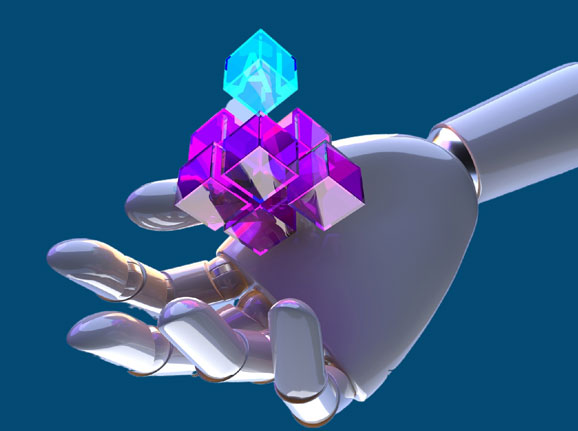Blockchain and AI
Market Size and Growth
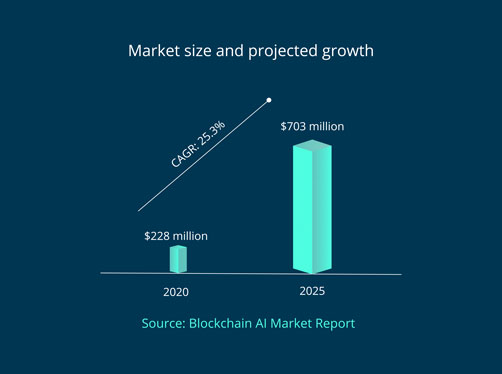
Understanding Blockchain Technology
- Cryptocurrencies: Bitcoin and Ethereum facilitate secure, transparent financial transactions.
- Supply Chain Management: IBM uses blockchain to enhance traceability and efficiency from product creation to sale.
- Identity Verification: Platforms like uPort provide secure, decentralized solutions for personal information management.
- Smart Contracts: Self-executing contracts with predefined conditions
Understanding AI Technology
Real-world Applications of AI
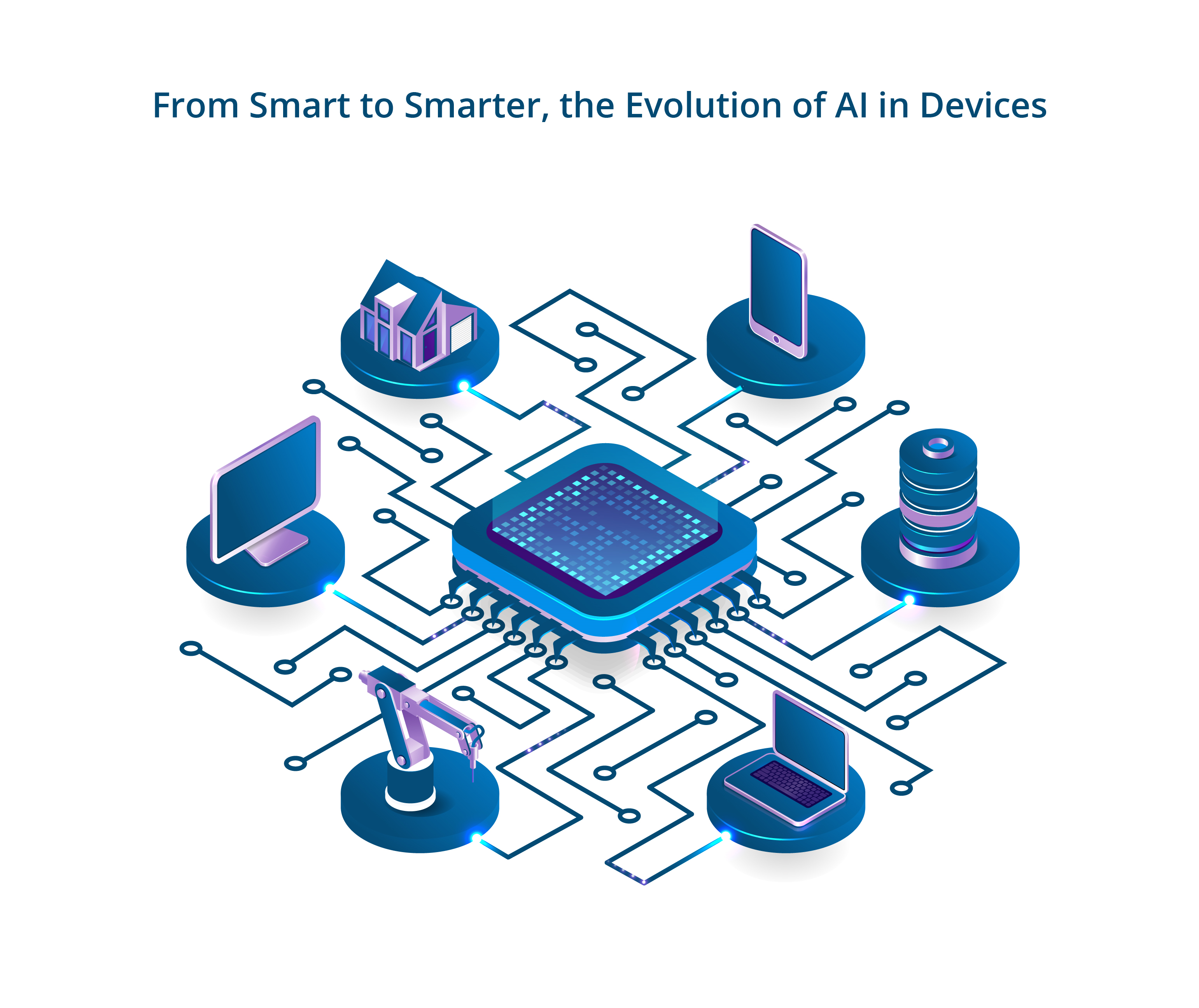
Synergies between Blockchain and AI
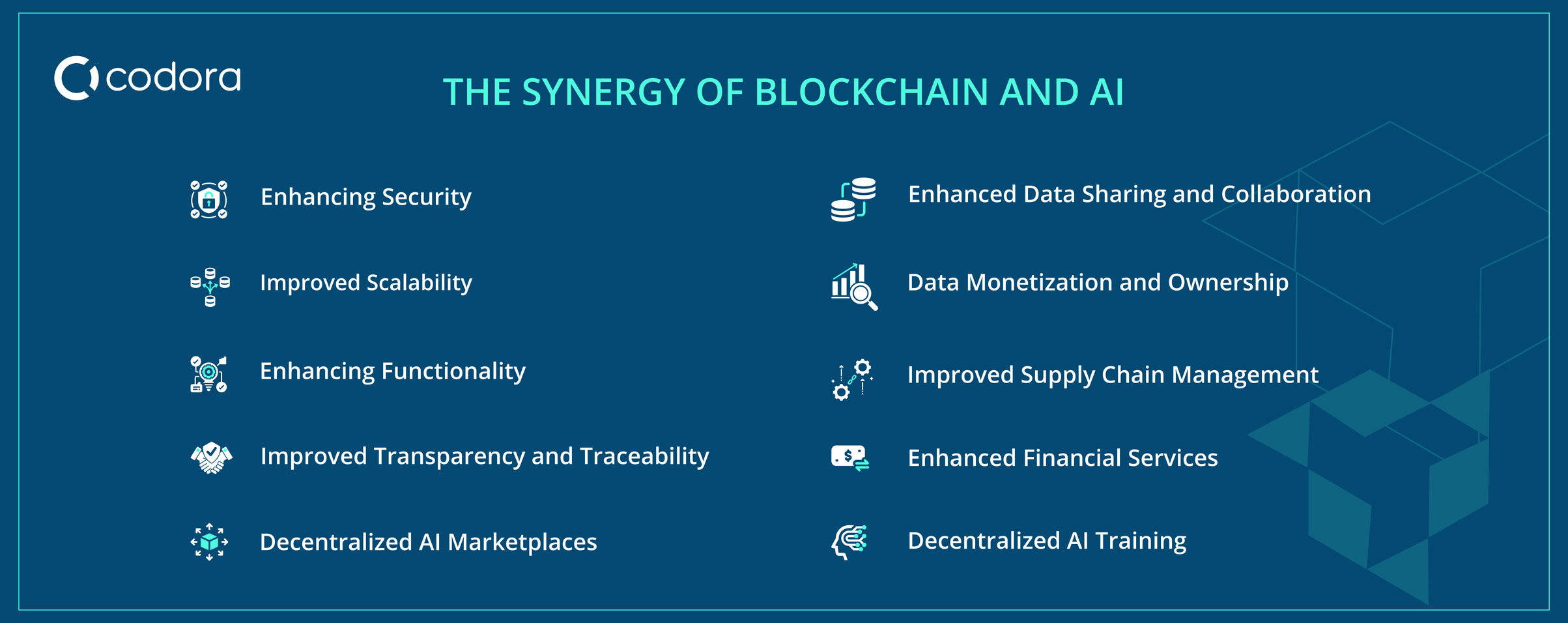
1. Enhancing Security: Blockchain technology already provides robust security through its decentralized and tamper-resistant nature. However, AI can further enhance security measures in blockchain applications. AI algorithms can analyze vast amounts of data to identify patterns and detect anomalies, strengthening fraud detection and prevention mechanisms. For example, AI-powered algorithms can detect suspicious transactions or identify potential hacking attempts in real-time, providing an additional layer of security to blockchain networks.
Example: CipherTrace (a Mastercard company), a blockchain security firm, leverages AI to enhance the security of blockchain networks. CipherTrace uses AI to track and analyze cryptocurrency transactions, helping to identify suspicious activities and prevent fraud. Their AI-powered solutions provide real-time threat intelligence and enhance the overall security of blockchain systems by continuously monitoring and analyzing transaction patterns and network behavior.
2. Improving Scalability: Scalability has been a challenge for blockchain networks, especially public ones like Bitcoin and Ethereum. AI can help develop innovative solutions to address scalability issues. AI algorithms can optimize network performance, improve consensus protocols, and facilitate efficient resource allocation. For instance, AI can dynamically adjust block sizes based on network demand, optimize transaction routing, and prioritize transactions based on their importance or urgency. These AI-driven optimizations can significantly improve the scalability of blockchain networks, enabling them to handle a larger volume of transactions.
Example: Fetch.ai’s decentralized marketplace leverages AI to optimize resource allocation. Initially, they faced scalability issues but overcame these by implementing advanced consensus protocols and hybrid technologies, significantly enhancing transaction efficiency and network performance (Coin Bureau,Crypto News Flash).
3. Enhancing Functionality: : Scalability has been a challenge for blockchain networks, especially public ones like Bitcoin and Ethereum. AI can help develop innovative solutions to address scalability issues. AI algorithms can optimize network performance, improve consensus protocols, and facilitate efficient resource allocation. For instance, AI can dynamically adjust block sizes based on network demand, optimize transaction routing, and prioritize transactions based on their importance or urgency. These AI-driven optimizations can significantly improve the scalability of blockchain networks, enabling them to handle a larger volume of transactions.
Example: SingularityNET is a blockchain-based platform that combines AI and decentralized networks to create a marketplace for AI services. The platform allows AI agents to interact, collaborate, and autonomously execute tasks based on smart contracts, enabling the creation of sophisticated AI applications with decentralized governance.
4. Improved Transparency and Traceability: Blockchain technology inherently provides transparency and traceability due to its immutable ledger and decentralized nature. When integrated with AI, this transparency can be significantly enhanced. AI algorithms can analyze blockchain records to ensure all transactions are legitimate and trace the origins of data or assets. This synergy is particularly beneficial in industries like supply chain management, healthcare, and finance, where tracking the provenance of goods, medical records, or financial transactions is crucial.
Example: IBM’s Food Trust platform uses blockchain to enhance transparency in the food supply chain. By integrating AI, the platform can analyze data to predict supply chain disruptions and ensure the traceability of food products from farm to table.
5. Decentralized AI Marketplaces: The integration of blockchain and AI can facilitate the creation of decentralized AI marketplaces where models and datasets can be securely shared, traded, and monetized. Blockchain ensures the integrity and provenance of these digital assets, while AI provides the tools to evaluate and utilize them effectively. These marketplaces democratize access to AI technologies, allowing smaller entities to benefit from advanced AI models without needing extensive resources.
Example: Ocean Protocol is a decentralized data exchange protocol that allows data providers to share their data while maintaining control over its usage. By integrating AI, Ocean Protocol enables sophisticated data analysis and monetization, creating a fair and transparent marketplace for data and AI services.
6. Enhanced Data Sharing and Collaboration Blockchain’s secure and decentralized nature creates a trusted environment for data sharing across organizations. When combined with AI, this can lead to improved collaboration, as AI models require diverse and high-quality datasets to function effectively. Blockchain ensures that the data shared is authentic and has not been tampered with, while AI uses this data to generate insights and improve decision-making processes.
Example: The MediLedger Project uses blockchain to create a secure network for pharmaceutical companies to share data on drug supply chains. By incorporating AI, the project aims to enhance data analysis capabilities, improving drug traceability and reducing counterfeiting.
7. Data Monetization and Ownership: Blockchain technology enables individuals and organizations to maintain ownership and control over their data. Through blockchain, data can be securely shared with AI systems while ensuring that data owners are compensated for its use. This creates new opportunities for data monetization, allowing data owners to benefit financially from sharing their data without losing control over it.
Example: Datum is a decentralized data marketplace where users can store and monetize their data. By integrating AI, Datum allows for more effective analysis and utilization of this data, providing value to both data owners and purchasers.
8. Improved Supply Chain Management:Blockchain’s ability to provide transparent and immutable records is highly beneficial in supply chain management. When combined with AI, these capabilities are enhanced, allowing for real-time optimization and prediction of supply chain activities. AI can analyze blockchain data to forecast demand, optimize logistics, and identify potential disruptions, leading to more efficient and resilient supply chains.
Example: VeChain uses blockchain to track products throughout the supply chain, providing transparency and authenticity. By integrating AI, VeChain enhances its predictive analytics capabilities, optimizing supply chain operations and reducing costs.
9. Enhanced Financial Services: The financial sector can greatly benefit from the synergy between blockchain and AI. Blockchain ensures secure, transparent, and efficient transactions, while AI enhances services such as fraud detection, risk assessment, and personalized financial advice. AI can analyze transaction patterns on the blockchain to identify fraudulent activities and assess risks more accurately, leading to more secure and efficient financial operations.
Example: Numerai is a hedge fund that uses blockchain to ensure the integrity of financial data and AI to develop trading strategies. By combining these technologies, Numerai enhances its data security and predictive accuracy, improving investment outcomes.
10. Decentralized AI Training: Decentralized AI training involves distributing the training process across multiple nodes, ensuring data privacy and security. Blockchain facilitates this by providing a secure and verifiable environment for data and model sharing. AI models trained in this manner benefit from diverse datasets without compromising data security, leading to more robust and generalized models.
Example: OpenMined is an open-source community focused on decentralized AI. By using blockchain, OpenMined ensures secure data sharing and collaboration for AI training, allowing for the development of AI models without centralized data aggregation.
Challenges and Considerations
- Scalability and Performance: Blockchain networks must handle the high computational demands of AI algorithms, requiring efficient consensus algorithms and optimized resource allocation.
- Data Quality and Integrity: High-quality, unbiased data is essential for effective AI models. Robust validation and cleaning processes are crucial to maintain data integrity.
- Regulatory and Legal Implications: Navigating varying regulations on data privacy and ownership is complex. Ensuring compliance across different jurisdictions is critical.
- Ethical Considerations: AI systems must be fair and transparent to avoid perpetuating biases. Ethical guidelines and transparency in AI development and deployment are necessary to build public trust.
Ethical AI Development
Future Outlook and Opportunities
Conclusion
In conclusion, the convergence of blockchain and AI holds immense potential to transform various industries by providing secure, transparent, and intelligent solutions. As we continue to explore this synergy, it is crucial to address the challenges and ethical considerations to build trustworthy systems. The future is bright for decentralized AI applications, and now is the time for entrepreneurs and developers to innovate and contribute to this exciting frontier.
Major industry leaders such as IBM, Microsoft, Alibaba, Tencent, Amazon, SAP, Salesforce, Oracle, Huawei, and Accenture are already leveraging the power of blockchain and AI, showcasing the immense potential and real-world applications of these transformative technologies.
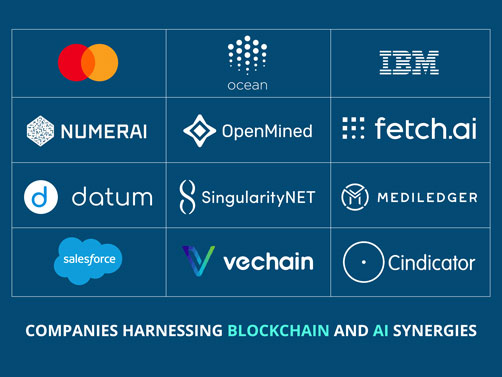
Collaborate with Codora
Codora is a trusted partner for enterprises exploring AI and Blockchain integration. As a dedicated blockchain software development company, our experts provide in-depth knowledge and deliver tailored solutions that align seamlessly with each business’s unique requirements.
Curious about how blockchain and AI can transform your business? Contact Codora for a consultation and explore tailored solutions to meet your unique needs. Don’t forget to subscribe to our newsletter for the latest updates and insights.

